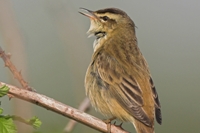Birdsong: keeping up with the Jones's

The little brown sedge warbler. Credit: Steve Round (rspb-images.com)
27 November 2007
Birdsong: keeping up with the Jones's
Winter may be approaching and our summer visitors gone, but listen carefully and there's still some song to remind us of spring's choruses. Writing in this month's journal Animal Behaviour, Dr Rupert Marshall of Aberystwyth University, and colleagues, throw further light on the wiley ways of our feathered songster friends.
Male birds usually sing to attract a mate and the little brown sedge warbler - a common sight on the Dovey Estuary in warmer months - is no exception. In fact it is pretty much the only reason he sings. And, like a bad boyfriend, once he's found a mate he gives up trying and doesn't sing again that year! But it turns out it's not quite as simple as previously thought. Dr Marshall's new research suggests that even if they only sing for a couple of days each year, they do try and keep up with local trends, dropping some trills and singing those of their neighbours instead, becoming more alike as each day passes.
As the years go by and a male grows older, he can sing more and more different types of whistles and trills. But he can't change the total number during the breeding season, even though it might make him more attractive to the females. So by matching what his neighbours sing he may be better able to defend his patch of ground while still courting the ladies. They might not admit it, but even birds try to keep up with the Jones's.
A copy of the full scientific paper is available from Dr Rupert C Marshall Tel: 01970 - 622320 (office hours) Fax: 01970 – 623111 Email: rmm@aber.ac.uk
About the author:
Dr Rupert Marshall joined the Institute of Biological Sciences, Aberystwyth University from Gothenburg University, Sweden, in September 2006, as Lecturer in Animal Behaviour.
His research centres around bird-song, mate choice and sexual selection, including song's effect on female physiology (e.g. hormone levels).
Other Authors
Drs Joanne Nicholson (Royal Holloway, University of London), Kate Buchanan (Cardiff University) & Prof. Clive Catchpole (RHUL)
About the journal
Animal Behaviour is a peer-reviewed scientific journal published by the Association for the Study of Animal Behaviour (ASAB).
ASAB is a registered charity (no. 268494) and publishes the journal Animal.



